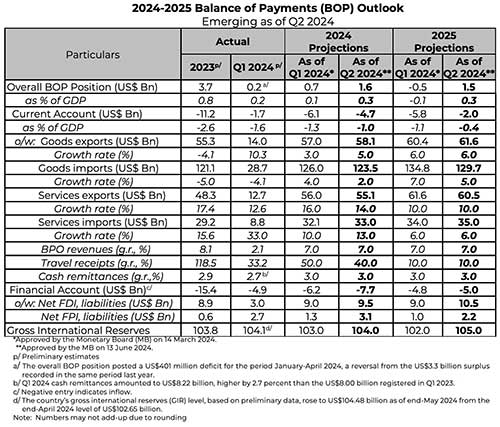
By Francis Allan L. Angelo
The Bangko Sentral ng Pilipinas (BSP) has approved new balance of payments (BOP) projections for 2024 and 2025, reflecting a positive outlook for the country’s external sector amidst steady global economic expansion and resilient domestic demand.
The latest BOP projections, approved during the Monetary Board’s meeting on June 13, incorporate recent data and developments, highlighting expectations of steady global economic growth.
This is supported by robust domestic demand and key structural reforms, including digitalization and local government devolution.
Global economic activity is projected to accelerate slightly faster in 2024 compared to earlier forecasts, largely due to stronger-than-expected U.S. GDP growth in Q4 2023.
The U.S. economy’s robust expansion is expected to partially offset the anticipated slowdown in China. Additionally, growth forecasts for world trade in 2024 and 2025 are higher than the 2023 figures, indicating a stable global economic landscape.
Domestically, the Philippines’ economy is expected to maintain its growth momentum. Key reforms, including new bilateral trade deals and enhanced digital infrastructure, are set to boost domestic demand.
The country’s merchandise exports have shown strong performance, particularly in electronics and semiconductors, while the services trade continues to thrive with increased tourist arrivals and demand for business process outsourcing (BPO) services.
The anticipated easing of inflation in 2024 is also expected to support consumer and investment demand.
“The emerging external outlook for 2024 and 2025 is cautiously optimistic compared to previous projections. While risks remain, the evolving geopolitical tensions in the Middle East warrant further monitoring,” the BSP said.
For 2024, the overall BOP position is projected to record a higher surplus than previously expected, driven by a lower current account deficit and increased non-resident investment inflows.
The merchandise trade gap is expected to narrow as import prices ease and goods exports recover, particularly in semiconductors and electronics.
The recently ratified Regional Comprehensive Economic Partnership (RCEP) Agreement is anticipated to boost trade by providing greater market access and reducing trade barriers.
Travel receipts and BPO revenues, along with steady remittance inflows from overseas Filipinos, will continue to support the current account.
Both foreign direct investments (FDIs) and foreign portfolio investments (FPIs) are expected to yield higher net inflows following strong figures in the first quarter.
The implementation of key investment reforms will provide a conducive business environment, while the ample level of international reserves will support the external sector prospects.
Looking ahead to 2025, the BOP position is expected to reverse into a surplus, with a narrower current account balance due to a reduced merchandise trade gap and higher financial account inflows.
Although services trade receipts are expected to grow robustly, they are unlikely to fully offset the trade deficit.
Non-resident investment flows are projected to sustain gains, albeit modestly, amid cautious investor sentiment due to potential policy shifts with new political leaders taking office in over 50 economies next year.
Ongoing geopolitical conflicts, particularly in Ukraine and the Middle East, may continue to pose challenges.
The BSP said it remains vigilant in monitoring external sector developments and risks to ensure the fulfillment of its price and financial stability objectives.


















